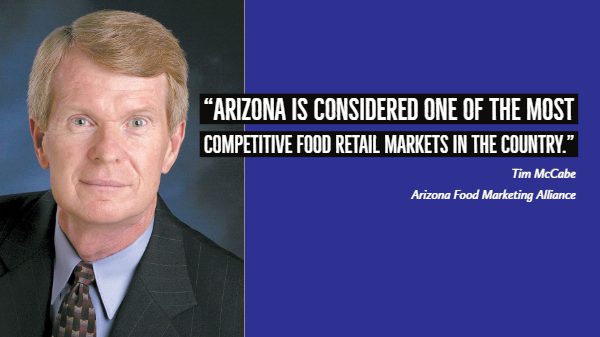The retail environment in Arizona is conducive to the fresh produce industry and continues to attract new entrants.
Tim McCabe, president of the Arizona Food Marketing Alliance in Phoenix, reports that the retail environment in the state is strong, with the economy continuing to get better.



Hard hit by the housing market downturn, Arizona has now turned the corner and gotten through the worst of the recessionary impact. This means more retailers are investing in their stores, remodeling, and building more stores in the last few years.
The competition is keen though, with a glut of stores having been built before the recession, based on the assumption the state’s population would continue to grow. While some of these stores have closed, there is still a multitude of stores.
“Arizona is considered one of the most competitive food retail markets in the country,” McCabe said. Though the state is overrun with stores, it is nonetheless “considered a very good place for retailers to invest in for the long term.”
Retailers not only believe the population will grow, but land is still relatively cheap, he said. “And the current retailers that are here want to make sure they protect their turf. Pricing, therefore, becomes very competitive and the beneficiary obviously is the consumer.”
Fortunately, there’s a good mix of different store types throughout the state, ranging from big box, national supermarkets, dollar stores, convenience stores, and warehouse clubs. Independent retailers are falling behind though and being chased out by chain stores.
And although the German megagrocers Aldi and Lidl haven’t opened shop in Arizona yet, McCabe says Aldi is building a warehouse in Phoenix with plans for multiple stores in Phoenix in the near future.
It’s too early to gauge the impact of a potential Aldi entry on the area’s fresh produce industry, though the sector is thriving in Arizona as fresh produce “becomes a bigger and bigger part of a typical grocery store today.”
Farmers markets are also growing. Overall, McCabe finds, “Today’s consumers are very concerned about nutrition, and they want all their products, not just produce, to be as fresh as possible.”
And while the onslaught of online retailing continues, with a significant increase in online orders for groceries, when it comes to fresh produce many consumers still want to see and touch the items before purchase.
Presently, this means online sales for fresh produce, mostly fruit, as well as meat, haven’t really taken off.
But, McCabe said, “Sales of fresh produce in stores is still growing and is very healthy.”
This is an excerpt from the most recent Produce Blueprints quarterly journal. Click here to read the full supplement.


